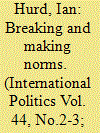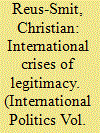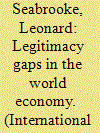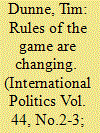|
|
|
Sort Order |
|
|
|
Items / Page
|
|
|
|
|
|
|
| Srl | Item |
| 1 |
ID:
077890


|
|
|
|
|
| Publication |
2007.
|
| Summary/Abstract |
The Kyoto Protocol has been ratified by 164 states and is now fully operational. However, the Bush administration's repudiation of the Protocol combined with the weakness of the targets raise a confronting question for students of legitimacy: is it possible for a regime to be legitimate but ineffective in solving the problem it is designed to address? I argue that effectiveness is an important component of the Protocol's legitimacy but that the parties have been reluctant to make an issue of effectiveness during the early phase of the Protocol's operation. However, the legitimacy of the Protocol is likely to wane, and the chronic international legitimacy crisis of the Bush administration's climate change policy is likely to become acute, as a result of poor performance. I conclude by suggesting what might constitute significant and timely adaptation that might resolve the US's chronic legitimacy crisis and the Protocol's waning legitimacy
|
|
|
|
|
|
|
|
|
|
|
|
|
|
|
|
| 2 |
ID:
077884


|
|
|
|
|
| Publication |
2007.
|
| Summary/Abstract |
International norms are influential when they are seen as legitimate, and recent American behaviour may undermine the legitimacy of norms on the use of force. I examine three kinds of legitimacy crisis that might arise from American revisionism. First, the US threatens to delegitimate the norms that it challenges, particularly on military preemption. Second, it threatens to undermine its own influence by disassociating American power from one source of legitimation. Finally, it may negate the basic idea of American hegemony as that term is understood in constructivist scholarship and so transform the structure of the international system. Any of these might lead to a crisis, though of different kinds. The American challenge to the customary law on preemption threatens to delegitimize both the existing norms and the social basis of US power, while also attempting to legitimize American interests and new understandings of the norms. It therefore shows the productive and destructive aspects of the power of legitimation in world politics. Legitimation is the link between states and the normative structures of international society
|
|
|
|
|
|
|
|
|
|
|
|
|
|
|
|
| 3 |
ID:
077889


|
|
|
|
|
| Publication |
2007.
|
| Summary/Abstract |
Self-determination is the cardinal right sought by Indigenous peoples and in practice it may require states to accept divisible sovereignty. For most states, self-determination is framed by decolonization and is applicable to Indigenous peoples only in limited senses of self-government within state structures. Self-determination, however, is enshrined in key human rights documents and by denying Indigenous peoples the right to it, they jeopardize the legitimacy of the human rights regime, and the legitimacy of the United Nations as a source of progressive international law. They also widen the rift between international and world society raising important questions for the legitimacy of the sovereignty system
|
|
|
|
|
|
|
|
|
|
|
|
|
|
|
|
| 4 |
ID:
077882


|
|
|
|
|
| Publication |
2007.
|
| Summary/Abstract |
What is an international crisis of legitimacy? And how does one resolve such crises? This article addresses these conceptual issues, laying the theoretical foundations for the special issue as a whole. An actor or institution experiences a crisis of legitimacy, it is argued, when the level of social recognition that its identity, interests, practices, norms, or procedures are rightful declines to the point where it must either adapt (by reconstituting or recalibrating the social bases of its legitimacy, or by investing more heavily in material practices of coercion or bribery) or face disempowerment. International crises of legitimacy can be resolved only through recalibration, which necessarily involves the communicative reconciliation of the actor's or institution's social identity, interests, practices, norms, or procedures, with the normative expectations of other actors within its realm of political action
|
|
|
|
|
|
|
|
|
|
|
|
|
|
|
|
| 5 |
ID:
077887


|
|
|
|
|
| Publication |
2007.
|
| Summary/Abstract |
Since the Asian financial crisis of 1997-1998, the International Monetary Fund (the Fund) has been embroiled in an international crisis of legitimacy. Assertions of a crisis are premised on the notions that the Fund's voting system is unfair, that the Fund enforces homogeneous policies onto borrowing member states and that loan programmes tend to fail. Seen this way, poor institutional and policy design has led to a loss of legitimacy. But institutionalised inequalities or policy failure is not in itself sufficient to constitute an international crisis of legitimacy. This article provides a conceptually-driven discussion of the sources of the Fund's international crisis of legitimacy by investigating how its formal 'foreground' institutional relations with its member states have become strained, and how informal 'background' political and economic relationships are expanding in a way that the Fund will find difficult to re-legitimate. The difference between the Fund's claims to legitimacy and how its member states, especially borrowers, act has led to the creation of a 'legitimacy gap' that is difficult to close. However, identifying the sources of the Fund's international crisis of legitimacy allows us to explore what avenues are available to resolve the crisis.
|
|
|
|
|
|
|
|
|
|
|
|
|
|
|
|
| 6 |
ID:
077883


|
|
|
|
|
| Publication |
2007.
|
| Summary/Abstract |
Claims by liberal states to be furthering democratic values and material prosperity are being contested due to the manner in which liberal states are attempting to provide for their own security, to the way in which democracy is being more forcefully projected onto the international order, and to the dislocations and inequality associated with global capitalism. The appeal of liberalism as a form of political and economic organization has declined even as its tenets have come to be taken for granted by virtue of their grounding in scientific reasoning. A sustainable resolution to the crisis of legitimacy of the liberal state requires the internal regeneration of the liberal state itself, a renewed commitment to dialogue in multilateral institutions, and a persuasive revitalization of the claims liberal states make that render their example attractive to others
|
|
|
|
|
|
|
|
|
|
|
|
|
|
|
|
| 7 |
ID:
077886


|
|
|
|
|
| Publication |
2007.
|
| Summary/Abstract |
This article examines whether the nuclear non-proliferation regime is in crisis. I argue that the nuclear non-proliferation treaty (NPT) is suffering a crisis of legitimacy in domestic US politics and a chronic legitimacy deficit globally, but this does not in and of itself mean that there is a crisis in the non-proliferation regime per se, so long as there are actors with the ability and will to pay the costs of coercive and diplomatic bargaining instruments to maintain the loss of voluntary compliance. Policies addressing nuclear non-proliferation by the nuclear weapons states and their allies have been overwhelmingly ensconced within those latter two mechanisms of compliance rather than addressing the chronic legitimacy deficit of the NPT caused by the continued possession of nuclear arsenals by the nuclear weapons states. The US under the Bush administration, however, has led the way in an attempt to reconstitute the social relations underpinning the non-proliferation regime by recognizing India as a responsible nuclear power. This recalibration portends a more fundamental challenge to a regime of universal nuclear non-proliferation than the approach of nuclear powers to date, which has been to neglect legitimacy concerns in favour of diplomatic carrots and sticks and, with the Bush administration in particular, the threat and use of force. I argue that it is likely to deepen the chronic legitimacy deficit of the NPT, thus requiring greater investment in war, or in diplomatic carrots and sticks that have sometimes proven insufficient, though it is possible a new nuclear condominium could settle that proves at least as stable as the past if not more, with but another addition or two. But even if it does, this strategy of re-legitimation puts further off rather than nearer attainment of the central principle and purposes of the regime
|
|
|
|
|
|
|
|
|
|
|
|
|
|
|
|
| 8 |
ID:
077888


|
|
|
|
|
| Publication |
2007.
|
| Summary/Abstract |
Is there a crisis of legitimacy in relation to fundamental human rights commitments? At one level, the human rights regime has endured legitimacy problems from the outset, in part due to the scope and complexity of the standards but also as a result of the unwillingness of states to regard human rights norms as properly binding. I argue that September 11 and the responses this event triggered in the foreign policies of leading states in international society have taken the challenge to the regime to a new level. What makes it a crisis of legitimacy is the fact that those were crucial to the emergence of the regime, and the rights that are under siege are core 'rights of the person' and not aspirational rights. The closing discussion examines the possibility for a restoration of legitimacy. Consistent with the earlier theoretical discussion, the question of whether and how the legitimacy crisis can be resolved requires a differential response, depending on the site of the crisis, and the location of the audience. The concepts of international and world society provide analytical leverage in identifying both the causes of the crisis and the prospects for its resolution
|
|
|
|
|
|
|
|
|
|
|
|
|
|
|
|
| 9 |
ID:
077885


|
|
|
|
|
| Publication |
2007.
|
| Summary/Abstract |
The United Nations Security Council (UNSC) is at the heart of the world's collective security system. It is upon this body that rests 'primary responsibility for the maintenance of international peace and security' (UN Charter, Article 24). In this article, we examine the current debate regarding the legitimacy crisis facing the UNSC. We consider its most usual manifestation, namely that the Council faces a crisis of legitimacy because of its inability to constrain the unilaterally inclined hegemonic United States. But we also examine the converse argument that it is the whole UN collective security mechanism (rather than just the Council) that is in crisis. According to this, it is the failure to recognize the unique dangers immanent within the contemporary security environment and the inability of the UN security system to tackle these which is the cause of the current crisis of legitimacy. International society, this position continues, must acknowledge these, and vest in the hegemon the powers it requires in order to meet its global responsibilities. Acknowledging the implications of both of these positions, we argue that the resolution of the current crisis of legitimacy is to be achieved through a more expansive interpretation of the Security Council's extant powers, accompanied by a commitment on the part of the United States to reinvest in the multilateral machinery upon which global order is founded
|
|
|
|
|
|
|
|
|
|
|
|
|
|
|
|
| 10 |
ID:
077891


|
|
|
|
|
|
|
|